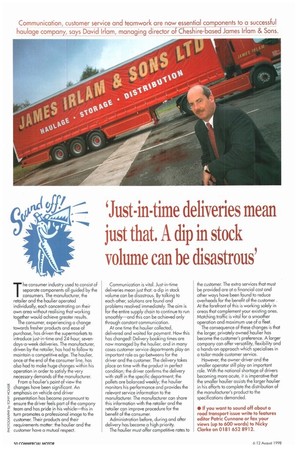Communication, customer service and teamwork are now essential components to
Page 52

If you've noticed an error in this article please click here to report it so we can fix it.
a successful haulage company, says David Irlam, managing director of Cheshire-based James Irlam & Sons.
'Just-in-time deliveries mean just that. A dip in stock volume can be disastrous'
The consumer industry used to consist of separate components all guided by the consumers. The manufacturer, the retailer and the haulier operated individually, each concentrating on their own area without realising that working together would achieve greater results.
The consumer, experiencing a change towards fresher products and ease of purchase, has driven the supermarkets to introduce just-in-time and 24-hour, sevendays-a-week deliveries. The manufacturer, driven by the retailer, has had to follow to maintain a competitive edge. The haulier, once at the end of the consumer line, has also had to make huge changes within his operation in order to satisfy the very necessary demands of the manufacturer. From a haulier's point of view the changes have been significant. An emphasis on vehicle and driver presentation has become paramount to ensure the driver feels part of the company team and has pride in his vehicle—this in turn promotes a professional image to the customer. Their products and their requirements matter: the haulier and the customer have a mutual respect, Communication is vital. Just-in-time deliveries mean just that: a dip in stock volume can be disastrous. By talking to each other, solutions are found and problems resolved immediately. The aim is For the entire supply chain to continue to run smoothly—and this can be achieved only through constant communication. At one time the haulier collected, delivered and waited for payment. How this has changed! Delivery booking times are now managed by the haulier, and in many cases customer service departments play an important role as go-betweens for the driver and the customer. The delivery takes place on time with the product in perfect condition; the driver confirms the delivery with staff in the specific department; the pallets are balanced weekly; the haulier monitors his performance and provides the relevant service information to the manufacturer. The manufacturer can share this information with the retailer and the retailer can improve procedure for the benefit of the consumer.
Administration before, during and after delivery has become a high priority. The haulier must offer competitive rates to the customer. The extra services that must be provided are at a financial cost and other ways have been found to reduce overheads for the benefit of the customer . At the forefront of this is working solely in areas that complement your existing ones. Matching traffic is vital for a smoother operation and maximum use of a fleet. The consequence of these changes is that the larger, privately owned haulier has become the customer's preference. A larger company can offer versatility, flexibility and a hands-on approach which specialises in a tailor-made customer service.
However, the owner-driver and the smaller operator still play an important role. With the notional shortage of drivers becoming more acute, it is imperative that the smaller haulier assists the larger haulier in his efforts to complete the distribution of the manufacturer's product to the specifications demanded.
• If you want to sound off about a road transport issue write to features editor Patric Cunnane or fax your views (up to 600 words) to Nicky Clarke on 0181 652 8912.












































































































